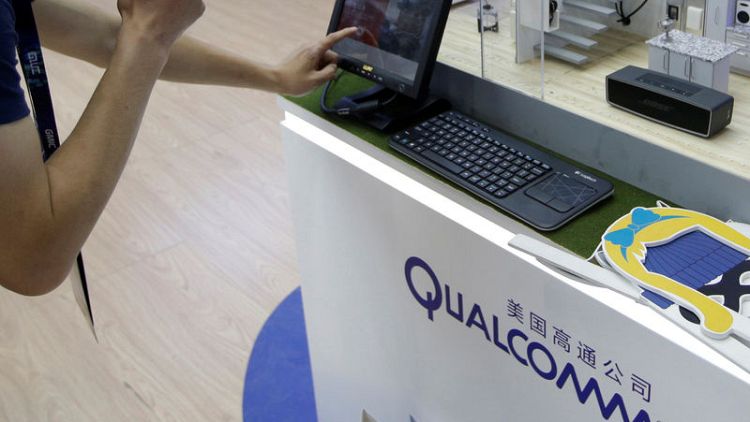FRANKFURT (Reuters) - A patent lawsuit filed by Qualcomm Inc <QCOM.O> against Apple Inc <AAPL.O> was thrown out by a German court on Tuesday, in a reversal for the U.S. chipmaker after it won a recent court ban on the sale of some iPhones in the country.
The regional court in the city of Mannheim dismissed the Qualcomm suit as groundless in an initial verbal decision, saying the patent in question was not violated by the installation of its chips in Apple's smartphones.
Qualcomm, waging a worldwide patent battle with Apple, said it would appeal after winning a separate case before a court in Munich in December that enabled it to enforce a ban on the sale of older iPhones in Germany.
"Apple has a history of infringing our patents," said Don Rosenberg, Qualcomm's executive vice president and general counsel.
"While we disagree with the Mannheim court's decision and will appeal, we will continue to enforce our (intellectual property) rights against Apple worldwide."
Apple declined to comment on the Mannheim decision. It referred to a statement issued in response to the Dec. 20 ruling in Munich, against which it is appealing.
Apple said at the time that, while a decision on the Munich appeal is outstanding, it would no longer stock the iPhone 7 and 8 at its 15 retail outlets in Germany, although its newer models would remain on sale.
All of its models remain available through carriers and resellers. Gravis, the leading Apple reseller in Germany, said on Tuesday it continued to stock the full range of iPhones.
Apart from the German order, Qualcomm has also secured a ban on the sale of some iPhones in China. Apple, which is also contesting that ruling, has continued to offer its iPhones in China but made changes to its iOS operating system following the order.
Qualcomm, meanwhile, faces a U.S. antitrust case brought by the Federal Trade Commission which accuses it of abusing a monopoly on mobile chip technology in a trial that could have a major impact on the smartphone industry.
If the government prevails in the trial that began on Jan. 4, Qualcomm could be forced to change its practices for licensing a trove of patents to device makers like Apple.
Apple is closely watching the FTC case, as it has its own pending lawsuit making similar claims against Qualcomm.
(Reporting by Douglas Busvine; Editing by Keith Weir)



